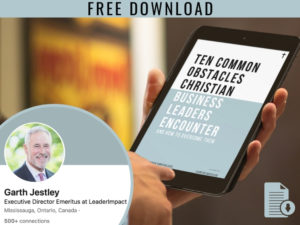
Cross Border Giving Around the World By Dr. Gary Hoag
Constructive Cross Border Giving Around the World
As we draw closer to Christ and grow in generosity, our heart of compassion enlarges for addressing big needs around the world. People cry for help, and we want to respond. But often our aid creates unhealthy dependency on external support. What if there is a way to build up local disciples to address the needs in an ongoing way?I think there is, and I get inspiration from Acts 16:9-10.
In that text, Paul saw a vision of a man “standing and begging” and saying, “come over… and help us.” The fact that the man was standing and begging reveals he was in a posture of service, not helplessness. From this text and my interaction with national workers around the world, I want to suggest two approaches to cross border giving that can “come and help” in a manner that reaps constructive results.
Support “Coffee Bean” Strategies
Let me explain with a story. At a break in GTP meetings in Central America in November 2020, I toured Finca Filadelphia, a coffee plantation that has operated for over a century in Antigua, Guatemala. There, I learned a powerful lesson, which I’ve shared widely ever since. It’s the secret to sustainability.
“Did you know that every coffee bean has two seeds?” the guide said. “One to share and one to sow!” He continued, “If we shared or consumed both seeds, since the plants take so long to produce fruit, we’d have no more coffee.” With a smile he added, “If we sowed both, we would not enjoy any coffee, and that’s not good either.”
So, a “coffee bean” strategy is one that uses about half the funding for program and half to rally new partnership. When a ministry overseas seeks $20,000, don’t send the money if 100% of the funds will be spent on program. Once they use up the funds, they will call for further outside support. Your gift leaves them no better off in the long
Instead, suggest that the ministry allocates about 50% or $10,000 for program and 50% or $10,000 for partnership work to raise local funds. This way, once they deplete the $20,000, rather than find themselves empty, they will be enriched with local giving. You can encourage healthy growth by asking them to report both program and partnership metrics.
Make Gifts that “Teach People to Fish”
Here, of course, I aim to bring to your mind the saying, “Give a man a fish and feed him for a day. Teach him how to fish and feed him for a lifetime.” With this approach, I urge you to make gifts that strengthen God’s workers and grow local capacity, rather than merely funding projects with 100% of the outside aid. Gifts like this become gifts that keep on giving. But how?
Make sure your gift builds up local stewards and bolsters ministries by asking them to demonstrate compliance with biblical standards, similar to the Seven Standards of Responsible Stewardship of ECFA for ministries in the USA. At GTP, we call them “peer accountability groups” or PAGs. We have helped set up PAGs in eight countries and counting. Find a list here.
PAGs foster local sustainable ministry by coaching stewards to position ministries for flourishing by following standards linked to fundraising, administration, and governance. If the ministry you support works in a country with a PAG, advise them to join to help them build trust and capacity. If not, let us know. GTP may be able to aid them starting a PAG there.
In addition to teaching stewards and expecting the ministries they serve to follow standards, designate all or a portion of your $20,000 gift as a matching gift. This requires the ministry to put to practice what they learn and raise local funds. You may offer additional gifts over multiple years to help them build a healthy base of local, regional, and national support.
The Choice is Yours!
Next time you hear cries for help from across international borders around the world, don’t just send money. Handouts create dependencies! Instead, make the choice to empower disciples to do the program and partnership work necessary for local sustainability.
Support “coffee bean” strategies that simultaneously grow program and partnership. And make gifts that “teach people to fish” or that build up stewards and teach them to follow standards that honor God and position them to flourish.
####
Gary G. Hoag, Ph.D., loves coffee and teaching people to catch trout on a fly rod. He serves as President & CEO of Global Trust Partners (GTP). In obedient service to Jesus Christ, GTP multiplies faithful stewards and mobilizes peer accountability groups (like ECFA in the USA) to build trust and to grow local generous giving to God’s work. To learn more, visit gtp.org
10 Common Obstacles Christian Business Leaders Encounter and How to Overcome Them!
 As a business leader, you have already overcome a multitude of external obstacles to get where you are today. But when it comes to following Jesus in the marketplace, most obstacles are not external—they’re inside your heart and mind.
As a business leader, you have already overcome a multitude of external obstacles to get where you are today. But when it comes to following Jesus in the marketplace, most obstacles are not external—they’re inside your heart and mind.
From personal experience in business leadership, I’ve identified 10 false beliefs frequently held by Christian business leaders, often subconsciously. 10 Common Obstacles Christian Business Leaders Encounter and How to Overcome Them offers a side-by-side comparison of those false beliefs and the reality of God’s perspective about you and what you do.
And because a good way to overcome false beliefs is to replace them with confessions anchored in the truth of God’s Word, when you sign up for my free download, you’ll also receive my 10-week email series: 10 Truths for Christian Business Leaders.
CLICK to Get Your Free Download

What is Christian Leadership Alliance?
Christian Leadership Alliance equips and unites leaders to transform the world for Christ. We are the leaders of Christ-centered organizations who are dedicated to faithful stewardship for greater kingdom impact.
Sign up for FREE blog updates.
Upcoming Events
Check back later!



